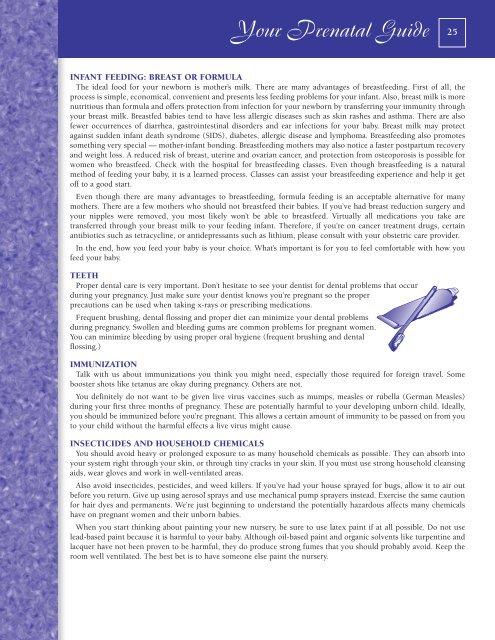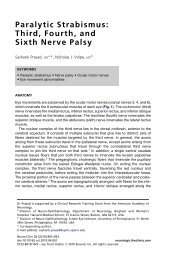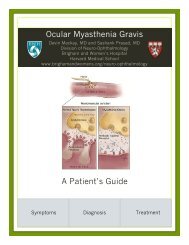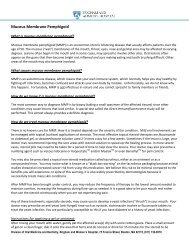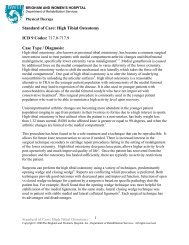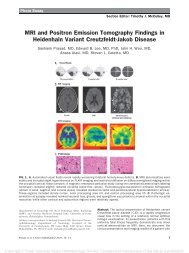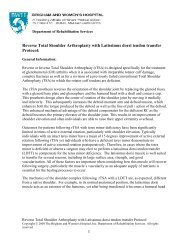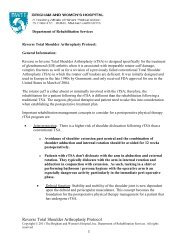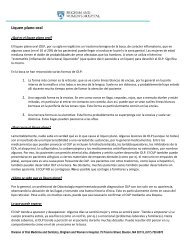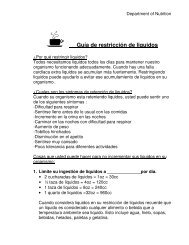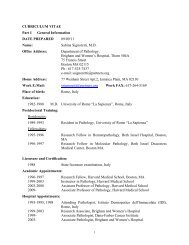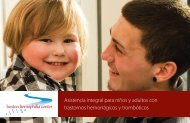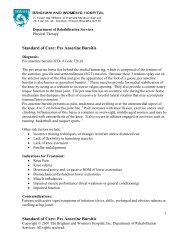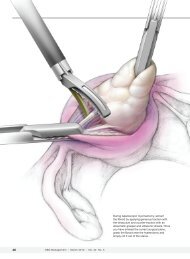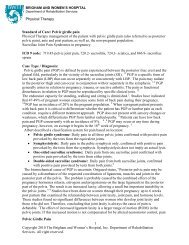Enjoying Your Pregnancy Guide to Understanding - Brigham and ...
Enjoying Your Pregnancy Guide to Understanding - Brigham and ...
Enjoying Your Pregnancy Guide to Understanding - Brigham and ...
Create successful ePaper yourself
Turn your PDF publications into a flip-book with our unique Google optimized e-Paper software.
<strong>Your</strong> Prenatal <strong>Guide</strong> 25<br />
INFANT FEEDING: BREAST OR FORMULA<br />
The ideal food for your newborn is mother’s milk. There are many advantages of breastfeeding. First of all, the<br />
process is simple, economical, convenient <strong>and</strong> presents less feeding problems for your infant. Also, breast milk is more<br />
nutritious than formula <strong>and</strong> offers protection from infection for your newborn by transferring your immunity through<br />
your breast milk. Breastfed babies tend <strong>to</strong> have less allergic diseases such as skin rashes <strong>and</strong> asthma. There are also<br />
fewer occurrences of diarrhea, gastrointestinal disorders <strong>and</strong> ear infections for your baby. Breast milk may protect<br />
against sudden infant death syndrome (SIDS), diabetes, allergic disease <strong>and</strong> lymphoma. Breastfeeding also promotes<br />
something very special –– mother-infant bonding. Breastfeeding mothers may also notice a faster postpartum recovery<br />
<strong>and</strong> weight loss. A reduced risk of breast, uterine <strong>and</strong> ovarian cancer, <strong>and</strong> protection from osteoporosis is possible for<br />
women who breastfeed. Check with the hospital for breastfeeding classes. Even though breastfeeding is a natural<br />
method of feeding your baby, it is a learned process. Classes can assist your breastfeeding experience <strong>and</strong> help it get<br />
off <strong>to</strong> a good start.<br />
Even though there are many advantages <strong>to</strong> breastfeeding, formula feeding is an acceptable alternative for many<br />
mothers. There are a few mothers who should not breastfeed their babies. If you’ve had breast reduction surgery <strong>and</strong><br />
your nipples were removed, you most likely won’t be able <strong>to</strong> breastfeed. Virtually all medications you take are<br />
transferred through your breast milk <strong>to</strong> your feeding infant. Therefore, if you’re on cancer treatment drugs, certain<br />
antibiotics such as tetracycline, or antidepressants such as lithium, please consult with your obstetric care provider.<br />
In the end, how you feed your baby is your choice. What’s important is for you <strong>to</strong> feel comfortable with how you<br />
feed your baby.<br />
TEETH<br />
Proper dental care is very important. Don’t hesitate <strong>to</strong> see your dentist for dental problems that occur<br />
during your pregnancy. Just make sure your dentist knows you’re pregnant so the proper<br />
precautions can be used when taking x-rays or prescribing medications.<br />
Frequent brushing, dental flossing <strong>and</strong> proper diet can minimize your dental problems<br />
during pregnancy. Swollen <strong>and</strong> bleeding gums are common problems for pregnant women.<br />
You can minimize bleeding by using proper oral hygiene (frequent brushing <strong>and</strong> dental<br />
flossing.)<br />
IMMUNIZATION<br />
Talk with us about immunizations you think you might need, especially those required for foreign travel. Some<br />
booster shots like tetanus are okay during pregnancy. Others are not.<br />
You definitely do not want <strong>to</strong> be given live virus vaccines such as mumps, measles or rubella (German Measles)<br />
during your first three months of pregnancy. These are potentially harmful <strong>to</strong> your developing unborn child. Ideally,<br />
you should be immunized before you’re pregnant. This allows a certain amount of immunity <strong>to</strong> be passed on from you<br />
<strong>to</strong> your child without the harmful effects a live virus might cause.<br />
INSECTICIDES AND HOUSEHOLD CHEMICALS<br />
You should avoid heavy or prolonged exposure <strong>to</strong> as many household chemicals as possible. They can absorb in<strong>to</strong><br />
your system right through your skin, or through tiny cracks in your skin. If you must use strong household cleansing<br />
aids, wear gloves <strong>and</strong> work in well-ventilated areas.<br />
Also avoid insecticides, pesticides, <strong>and</strong> weed killers. If you’ve had your house sprayed for bugs, allow it <strong>to</strong> air out<br />
before you return. Give up using aerosol sprays <strong>and</strong> use mechanical pump sprayers instead. Exercise the same caution<br />
for hair dyes <strong>and</strong> permanents. We’re just beginning <strong>to</strong> underst<strong>and</strong> the potentially hazardous affects many chemicals<br />
have on pregnant women <strong>and</strong> their unborn babies.<br />
When you start thinking about painting your new nursery, be sure <strong>to</strong> use latex paint if at all possible. Do not use<br />
lead-based paint because it is harmful <strong>to</strong> your baby. Although oil-based paint <strong>and</strong> organic solvents like turpentine <strong>and</strong><br />
lacquer have not been proven <strong>to</strong> be harmful, they do produce strong fumes that you should probably avoid. Keep the<br />
room well ventilated. The best bet is <strong>to</strong> have someone else paint the nursery.


